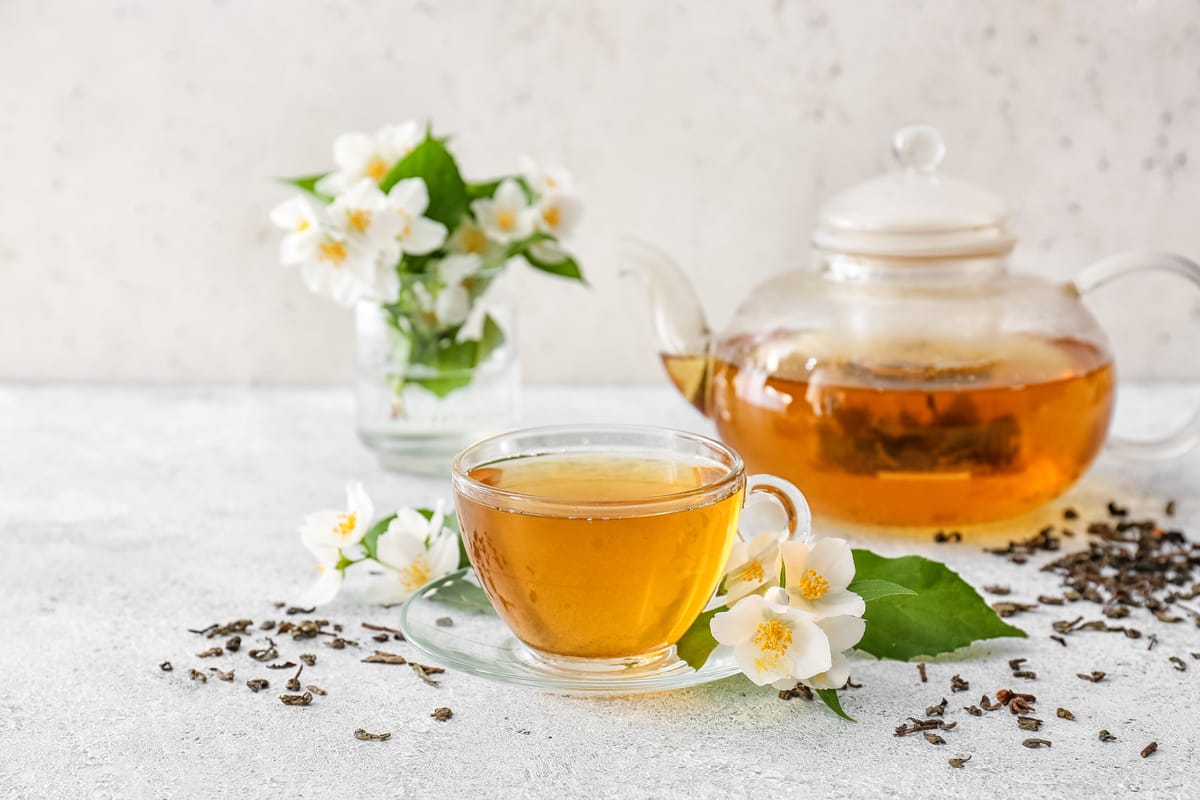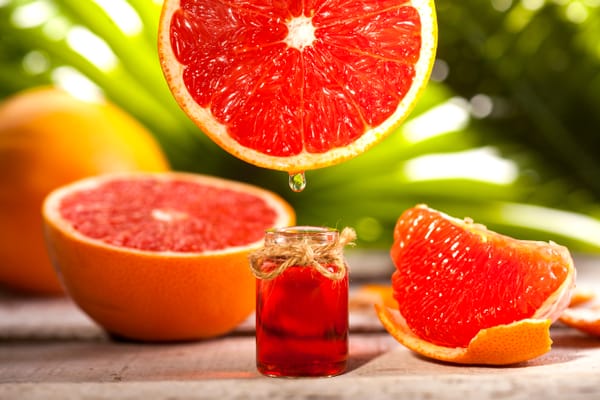Is Jasmine Tea Caffeinated? The Surprising Truth Revealed
Discover the truth about jasmine tea's caffeine content and how it compares to other teas. Learn about the factors that influence caffeine levels in jasmine tea.

Is jasmine tea caffeinated? It's a question that's been on the minds of tea lovers everywhere. I mean, who doesn't love the sweet, floral aroma of jasmine tea? But what about the caffeine kick? Are you going to be bouncing off the walls after a cup or two?
Listen up, folks! Jasmine tea isn't just another pretty face in the tea world. This beloved beverage has been hiding a secret, and it's time to spill the beans on its caffeine content. Brace yourself for a revelation that will change the way you look at this fragrant cup of joy!
Table of Contents:
- What Is Jasmine Tea?
- Health Benefits of Jasmine Tea
- Caffeine Content in Jasmine Tea
- How to Brew the Perfect Cup of Jasmine Tea
- Jasmine Tea Blends and Varieties
- Conclusion
What Is Jasmine Tea?
Jasmine tea is a type of scented tea that's been around for centuries. It's made by combining tea leaves with jasmine flowers to create a fragrant, flavorful beverage. The most common base for jasmine tea is green tea, but you can also find jasmine black tea, white tea, and oolong tea. Each type of tea brings its own unique flavor profile to the mix.
Types of Jasmine Tea
When it comes to types of jasmine tea, the possibilities are endless. The most popular is jasmine green tea, which combines the delicate flavor of green tea with the sweet aroma of jasmine blossoms. But if you're looking for something a little different, try jasmine white tea or jasmine oolong tea. White tea has a lighter, more subtle flavor, while oolong tea is known for its complex, fruity notes. And let's not forget about herbal jasmine tea, which is made with just jasmine flowers and no tea leaves. It's a great option if you're looking for a caffeine-free beverage.
How Jasmine Tea Is Made
The process of making jasmine tea is a true art form. It all starts with selecting the perfect tea leaves and jasmine blossoms. Tea makers typically use a green tea base, but other types of tea like black, white, or oolong can also be used. The tea leaves are then scented with fresh jasmine flowers, which are layered on top of the leaves and left to infuse their aroma. This scenting process is usually done in the evening when the jasmine flowers are at their most fragrant. The flowers may be added and removed several times to achieve the desired level of jasmine flavor.
Caffeine Content in Jasmine Tea
One of the most common questions people have about jasmine tea is how much caffeine it contains. The answer depends on the type of tea used as the base. Jasmine green tea typically has around 25 mg of caffeine per 8-ounce cup, which is about a quarter of the amount found in a cup of coffee. Jasmine black tea tends to have a bit more caffeine, around 45 mg per cup. If you're looking for a caffeine-free option, herbal jasmine tea is the way to go. It's made with just jasmine blossoms and no tea leaves, so it's naturally free of caffeine.
Health Benefits of Jasmine Tea
Not only does jasmine tea taste delicious, but it also offers some impressive health benefits. From boosting brain function to promoting weight loss, this fragrant tea is a true powerhouse.
Boosts Brain Function
If you're looking for a natural way to sharpen your mind, jasmine tea may be just what you need. Studies have shown that the combination of caffeine and L-theanine found in jasmine green tea can improve short-term memory and boost mood-enhancing neurotransmitters. I've personally noticed a difference in my focus and mental clarity when I make jasmine tea a regular part of my routine. It's become my go-to beverage for those long workdays when I need an extra cognitive boost.
Promotes Weight Loss
If you're trying to shed a few pounds, jasmine tea may be a valuable addition to your weight loss plan. The caffeine and catechins found in jasmine green tea have been shown to boost metabolism and increase fat burning. Of course, jasmine tea alone won't melt away the pounds. But when combined with a healthy diet and regular exercise, it can be a useful tool in your weight loss journey.
Supports Heart Health
Jasmine tea, particularly when made with a green tea base, is rich in antioxidants that can help protect your heart. These antioxidants work to reduce inflammation and oxidative stress, which are major risk factors for heart disease. A study published in the Journal of the American Heart Association found that drinking green tea regularly was associated with a lower risk of heart disease and stroke.
Reduces Stress and Anxiety
There's something inherently calming about sipping a warm cup of jasmine tea. The soothing aroma and flavor can help ease stress and promote relaxation. But the benefits go beyond just the sensory experience. The L-theanine found in jasmine green tea has been shown to reduce anxiety and promote a sense of calm. As someone who deals with occasional bouts of stress and anxiety, I've found that taking a few minutes to enjoy a cup of jasmine tea can make a real difference in my mood and overall sense of well-being.
Caffeine Content in Jasmine Tea
While jasmine tea does contain caffeine, the amount can vary depending on a few different factors. Here's what you need to know.
Factors Affecting Caffeine Content
The type of tea used as the base is one of the biggest factors that determines the caffeine content of jasmine tea. Green tea tends to have less caffeine than black tea, while white tea has the least amount of caffeine. Other factors that can affect the final caffeine content include the quality and quantity of tea leaves used, the steeping time, and the water temperature.
Comparing Caffeine in Jasmine Tea to Other Teas
To give you a better idea of how the caffeine in jasmine tea stacks up, let's compare it to some other popular teas. An 8-ounce cup of jasmine green tea typically contains around 25 mg of caffeine, which is less than half the amount found in a cup of black tea (40-70 mg) and about a quarter of the amount in a cup of coffee (95 mg). Herbal teas, like chamomile or peppermint, are naturally caffeine-free. So if you're looking for a jasmine tea option with no caffeine, an herbal jasmine blend is the way to go.
Decaffeinated Jasmine Tea Options
If you love the flavor of jasmine tea but are sensitive to caffeine, you'll be happy to know that decaffeinated options are available. However, it's important to note that even decaffeinated teas may contain trace amounts of caffeine. If you're extremely sensitive, it's best to stick with an herbal jasmine tea or consult with your healthcare provider.
The Mayo Clinic advises most healthy adults can safely ingest up to 400 milligrams of caffeine each day.
How to Brew the Perfect Cup of Jasmine Tea
Brewing the perfect cup of jasmine tea is an art and a science. Here are some tips to help you get the most out of your tea.
Choosing Quality Jasmine Tea Leaves
The quality of your tea leaves can make a big difference in the final flavor of your jasmine tea. Look for tea leaves that are fresh, whole, and have a strong jasmine aroma. Avoid tea bags or pre-ground leaves, as these tend to be lower quality and may not have as much flavor. Instead, opt for loose leaf tea or jasmine pearls, which are hand-rolled green tea leaves scented with jasmine blossoms.
Optimal Water Temperature and Steeping Time
To bring out the best flavor in your jasmine tea, it's important to use the right water temperature and steeping time. For jasmine green tea, aim for a water temperature of around 160-180°F (70-80°C) and steep for 1-3 minutes. If you use water that's too hot or steep for too long, your tea may turn out bitter. If you're using a different type of tea as the base, like black or oolong, you may need to adjust the water temperature and steeping time accordingly. A good rule of thumb is to follow the instructions on the tea package or consult with a tea expert.
Enjoying Jasmine Tea Hot or Iced
Jasmine tea is delicious both hot and iced. To make iced jasmine tea, simply brew a stronger batch of tea using more leaves and less water, then pour over ice and enjoy. You can also add a touch of honey or lemon to your jasmine tea for a bit of extra flavor. Or try mixing it with other teas or herbs to create your own unique blend. Personally, I love sipping on a hot cup of jasmine tea in the morning to start my day off right. But on a hot summer day, nothing beats a tall glass of iced jasmine tea with a sprig of fresh mint.
Jasmine Tea Blends and Varieties
One of the great things about jasmine tea is its versatility. There are countless blends and varieties to choose from, each with its own unique flavor profile.
Popular Jasmine Tea Blends
Some of the most popular jasmine tea blends include:
- Jasmine green tea
- Jasmine white tea
- Jasmine oolong tea
- Jasmine black tea
- Jasmine pearl tea
Each of these blends uses a different type of tea as the base, which affects the final flavor and caffeine content. Jasmine pearl tea, for example, is made by hand-rolling green tea leaves into small pearls and scenting them with jasmine blossoms. The result is a delicate, fragrant tea with a slightly sweet flavor.
Creating Your Own Jasmine Tea Blends
If you're feeling creative, you can also try making your own jasmine tea blends at home. Start with a base of your favorite tea, like green or oolong, and add in some dried jasmine flowers or jasmine-scented tea leaves. You can also experiment with adding other herbs or spices to your blend, like lavender, rose petals, or cinnamon. The possibilities are endless. One of my favorite homemade blends is a jasmine green tea with a hint of vanilla and honey. It's the perfect balance of sweet and floral, and always puts a smile on my face.
Key Takeaway:
Yes, jasmine tea contains caffeine, but the amount varies based on the type of tea used as its base. For a buzz without too much kick, go for jasmine green tea; it's got less caffeine than coffee or black tea. If you're avoiding caffeine altogether, pick herbal jasmine instead.
Conclusion
So, is jasmine tea caffeinated? The answer is a resounding "it depends." The caffeine content in jasmine tea can vary based on the type of tea used as a base, the quality of the leaves, and the brewing method.
Ready for some good news? Jasmine tea has got you covered, whether you need a gentle nudge to get going or a serious caffeine kick. Plus, its alluring floral fragrance and possible health perks make it a beverage you won't want to miss.
So go ahead, brew yourself a cup of jasmine tea, and enjoy the journey of discovering your perfect blend. Your taste buds (and maybe even your energy levels) will thank you.




